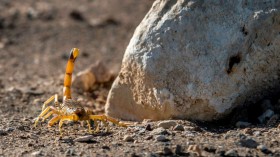Male fruit flies that are forced to compete with other males die younger, a new study has found.
The study, conducted by researchers at the University of Liverpool, shows that competition for sex reduces a male fly's longevity.
The study was conducted on Drosophila subobscura. Researchers kept the flies alone or in groups. Male flies in groups tend to fight to find a mate because females of this species are monandrous and mate with only one fly in their lives.
According to the researchers, competitors might be disturbing males' sleep pattern, which could affect their long-term health. Research on humans, too, has shown that poor sleep can cause several health problems and even reduce lifespan.
"When we see stags fighting over mates, it's obvious what the potential costs to the males are, but in this case it's more subtle. The flies aren't using antlers to beat each other into submission, but instead are harassing each other to the point where exhaustion causes them to die young," said Dr Anne Lizé, who led the study, according to a news release.
The study was published in the Proceedings of the Royal Society B and was funded by the Natural Environment Research Council.
What's more, furiously competing for mate might not even lead to rewards for the male flies. Researchers found that females opt for flies that were kept single. In the study, female flies refused to mate with three-fourth of males that had engaged in fights.
Previous research has shown that sexual frustration can lead to early death in fruit flies.
"The idea that competition has more subtle effects on a male could be extended to other species that humans are trying to breed or keep healthy," Lizé said in a news release.
© 2024 NatureWorldNews.com All rights reserved. Do not reproduce without permission.





